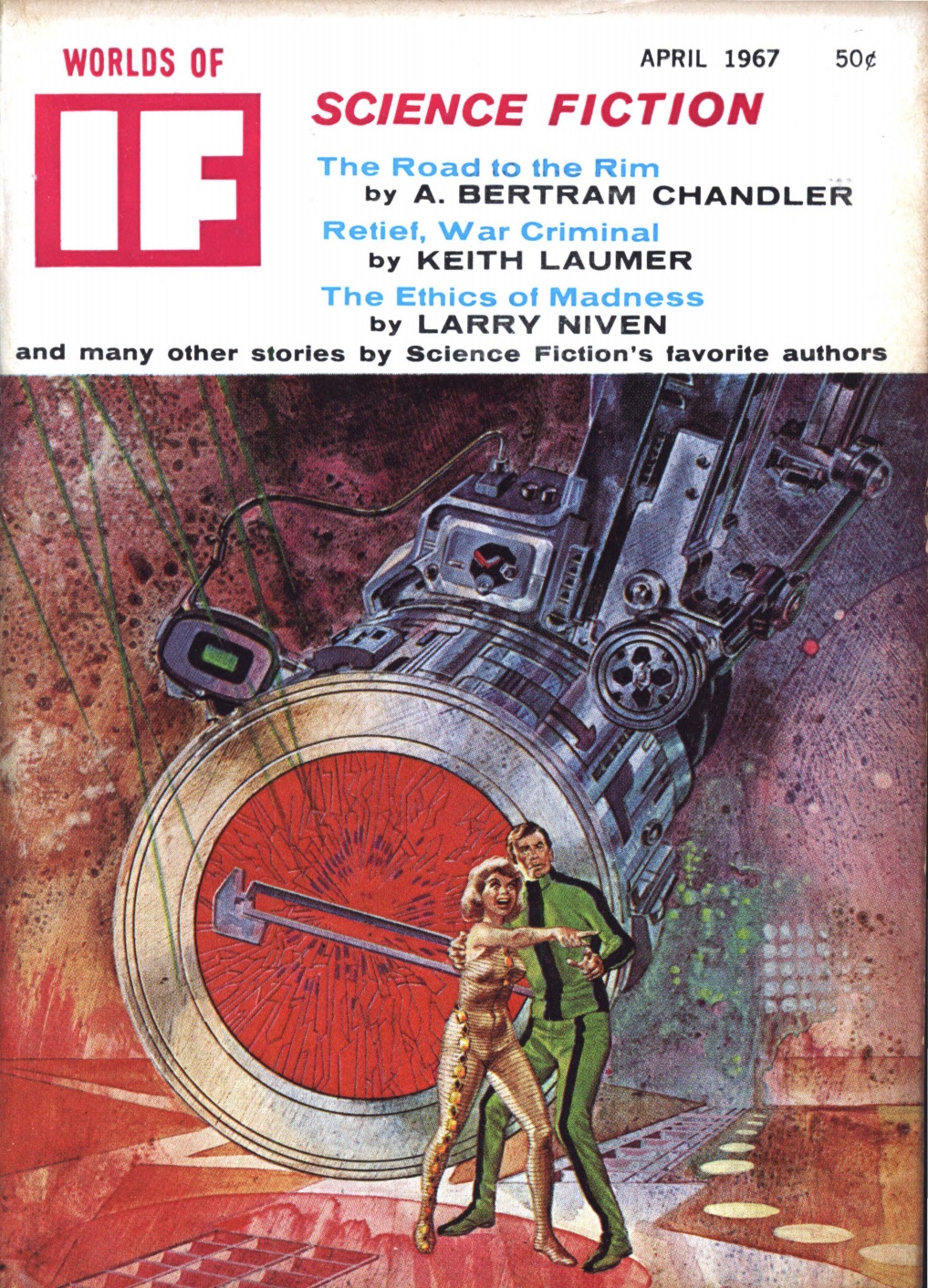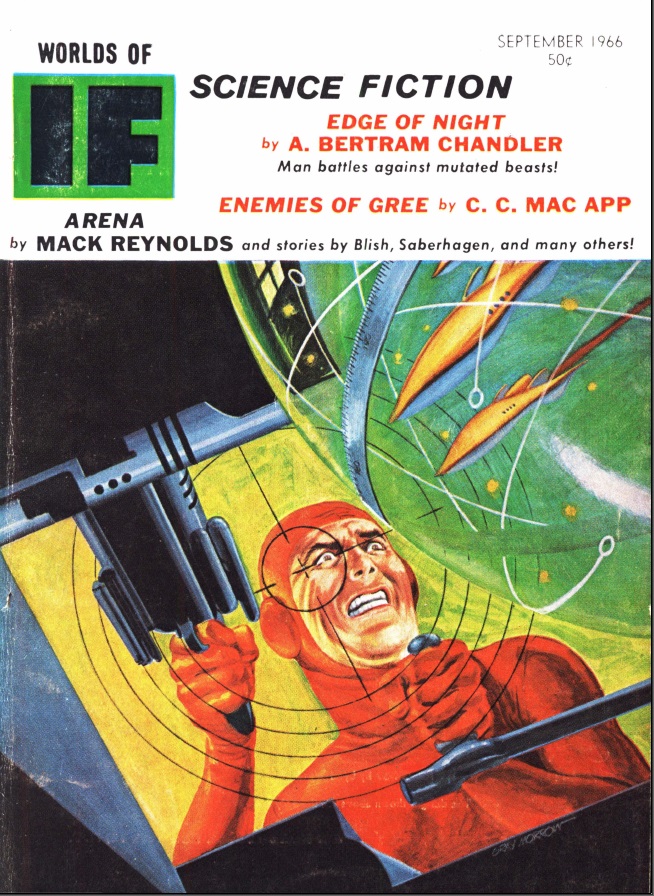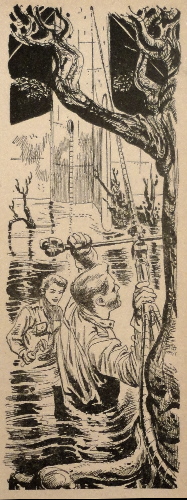
by John Boston
[Want to talk to the Journey crew and fellow fans? Come join us at Portal 55! (Ed.)]

Just as I feared, the September 1963 Amazing marks the return, after too short an absence, of Robert F. Young, who in Boarding Party moves on from his twee recapitulations of the Old Testament to, I kid you not, Jack and the [REDACTED] Beanstalk. Alien space traveler needs to enrich the soil in the on-ship farm, finds an out-of-bounds planet with the right kind of dirt, and lowers a big tube to suck it up; but one of the natives (those protected by the out-of-bounds designation) climbs the tube, and makes off with a “Uterium 5 Snirk Bird, a Toy Friddle-fork, and Two Containers of Yellow Trading Disks,” it says here. The aliens all have names of four syllables separated by hyphens, and you can fill in the blanks for this one. One guttering star—a tiny red dwarf at best.

But the issue opens with Poul Anderson’s Homo Aquaticus, illustrated on the cover by a swimmer with a menacing look and a more menacing trident, next to a nicely-rendered fish, in one of artist Lloyd Birmingham’s better moments. This is one of Anderson’s atmospheric stories, its mood dominated by Anglo-Saxon monosyllables. No, not those—I mean fate, guilt, doom, that sort of thing. The story’s tone is set in the first paragraph, in which the protagonist “thought he heard the distant blowing of a horn. It would begin low, with a pulse that quickened as the notes waxed, until the snarl broke in a brazen scream and sank sobbing away.”
This is rationalized as the wind in the cliffs, but we know better. The good (space)ship Golden Flyer and its crew have been sentenced to roam the galactic hinterlands after some of their number betrayed other ships of the Kith, a starfaring culture separated from planetary cultures by relativistic time dilation. Right now they’re looking at what used to be a colony planet, but all they see is ruins, until their encounter with the colony’s descendants, as given away by the title. In the end, doom and fate are tempered with rationality and mercy. Three stars, but towards the top of Anderson’s middling range.

After these two short stories, there is only one other piece of fiction in the issue, A. Bertram Chandler’s long novella The Winds of If, an entry in what now seems to be a series about goings-on on the Rim (of the galaxy), with a couple of magazine stories and a novel, The Rim of Space, already published. The plot: tramp space freighter is about ready for the knackers, or breakers, or whatever, but the crew gets hired by a Commodore Grimes to take an experimental ship on a long flight—a lightjammer, propelled by the pressure of light against large sails.
Two women, a journalist and an engineer, are added to the crew, which already includes one woman. Soap opera ensues, and one of the women decides to present her inamorata with a really special gift—genuine faster-than-light travel. The lightjammer is by now at 0.9 per cent of light speed, so a little push should put it over, right? Like a bucket of gunpowder detonated at the stern?
I’m really not the one to judge—hey, I’m still a couple of years away from high school physics—but hasn’t Chandler stumbled into a sort of relativistic Fool’s Mate here? There’s an obvious arithmetical problem; wouldn’t you need a lot more 9s after that decimal point to get close enough to c for such a little push to put you over? But more importantly, doesn’t matter get more massive the closer you get to c, meaning a corresponding increase in inertia would defeat any attempt to sneak over the line with a little added acceleration? Where’s Julio Gomez when you need him?
Anyway, in the story it works, and it precipitates the characters into a series of strange experiences which I won’t detail, save to say that the soap opera intensifies and permutates, and we get a good dose of low-level male-chauvinism as the women prove slaves to their emotions. Aside from that, it’s smoothly written and perfectly readable if you don’t have anything better to do, but that and the cartoon science get it two stars. Also, the characters smoke cigarettes. A lot. On board an enclosed vessel that has only the air it can bring with it or manufacture in flight. How likely is it that smoking would be tolerated on a long-haul spaceship? Inquiring minds think that’s about as silly as the gunpowder-bucket FTL drive.

This month’s non-fiction piece is Ben Bova’s article Neutrino Astronomy—reasonably informative but dull, and briefly worse than dull as he unveils the Useless Simile of the Month. One section of the article is headed The Stellar Pituitary Gland, and it says here: “Neutrinos might well control the aging process in the Sun, much as the pituitary gland is suspected to regulate aging in human beings.” P’tooey! Two stars.

So, once again, Amazing brightened up for a month, with several excellent stories last month, but now as usual the wet blanket of mediocrity has descended again.



 What are these robots up to? Art by Gaughan
What are these robots up to? Art by Gaughan
![[April 4, 1967] Transitions (May 1967 <i>IF</i>)](https://galacticjourney.org/wp-content/uploads/2022/03/IF-Cover-1967-05-672x372.jpg)
![[March 4, 1967] Mediocrities (April 1967 <i>IF</i>)](https://galacticjourney.org/wp-content/uploads/2022/02/IF-Cover-1967-03-672x372.jpg)


![[September 2, 1966] On the Edge (October 1966 <i>IF</i>)](https://galacticjourney.org/wp-content/uploads/2021/08/IF-1966-10-Cover-662x372.jpg)



![[August 2, 1966] Mirages (September 1966 <i>IF</i>)](https://galacticjourney.org/wp-content/uploads/2021/07/IF-1966-09-Cover-654x372.jpg)











